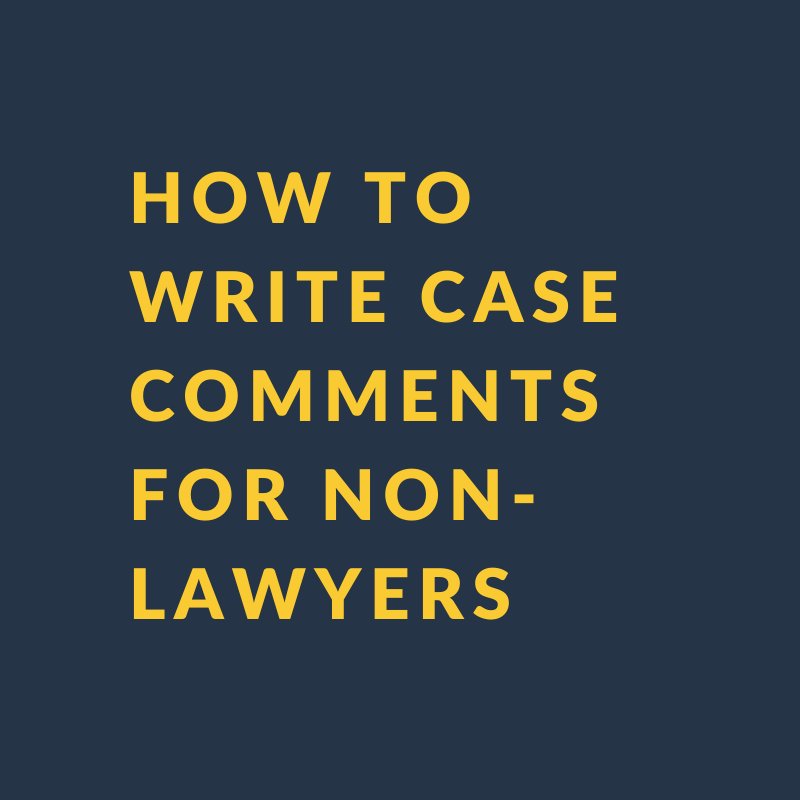Maybe, but the damage is reversible.
Growing up, I enjoyed writing. Through high school and undergrad, I took pleasure in crafting essays. I liked tinkering with words, figuring out the best way to express my thoughts. I enjoyed reading good writing.
But something happened during law school and my first few years of practice.
I was still writing a lot. More than ever, in fact. I was still reading a lot too. But I stopped thinking so much about writing.
I was more focused on getting the analysis right, ensuring my research was thorough, my citations impeccable. I was learning the language of law - not just Latin terms like prima facie, but little things, too, like what to call judges. (I winced recently when I came across an old law school essay in which I repeatedly referred to the former Chief Justice as, simply, “McLachlin”.)
I still aimed for clarity and good grammar, but I lost interest in style. I think that unconsciously, I was resigning myself to the fact that good style is unachievable when writing with the precision required of lawyers.
Why practising law is ruining our writing
It’s strange. Lawyers write for a living, yet we are becoming poorer at it in the process. There are several reasons for this:
1. The law is complex.
We’ve all heard that the secret to good writing (good non-fiction writing, at least) is being clear and concise. But the law is knotty, complex, and nuanced. So how do we write clearly about something that is, by its nature, complicated? Many of us don’t. We give up, feeling we have to put precision above style.
2. We’re busy.
As practicing lawyers, we have many competing demands on our time. Many of us bill by the hour. We feel we can’t afford the time necessary to transform passable writing into good writing.
3. We read a lot of clunky writing.
Litigators read a lot of cases, pleadings, and missives from other lawyers. While many judges and lawyers write well, most of us rely to some extent on technical, archaic, and simply clunky language. If you read “during the time that” enough times, it begins to seem normal to use that instead of “while”.
4. We suffer from the "curse of knowledge”.
This piece in the Harvard Business Review describes the curse of knowledge well. In essence, our expertise makes it harder for us to explain things to people. To quote the authors, Chip and Dan Heath:
The problem is that once we know something—say, the melody of a song—we find it hard to imagine not knowing it. Our knowledge has “cursed” us. We have difficulty sharing it with others, because we can’t readily re-create their state of mind.
The curse of knowledge creates problems when we’re writing for a non-legal audience, and when we’re writing for an audience less familiar with the specifics of our case.
How we can improve
The good news? It is absolutely possible for us to become better writers, even under time constraints. And because, as lawyers, we get so much practice at writing, we have the chance to become really, really good at it.
What it takes is some intention and attention. Here’s what’s worked for me:
1. Read a book about writing.
This is the fun part! Seriously. There are so many fantastic books about legal writing. And not just informative books. Truly enjoyable, read-before-bed, can’t-put-them-down books.
One of my favourites is Bryan A. Garner’s Legal Writing in Plain English. It's a gem. A quick read made up of small, digestible chapters. And Garner is a lovely writer. I downloaded the Kindle version on my phone and read it in my free moments here and there, screenshotting anything I wanted to reference later. (The book contains exercises for every chapter, but even ignoring those, I think I got a lot out of it.)
2. Read good writing.
This part is fun too. If you want to be a good writer, you must read good writing.
There’s good legal writing at every level of court. You may already have your favourites. Some judges are particularly known for their writing. The Honourable Ian Binnie was well known for his judgments during his 14 years on the Supreme Court. But don’t just look at cases for good legal writing. Look out for it everyday. You’ll know when an opponent’s factum is well-written. Pay attention to what you like about it.
Reading good non-legal writing helps too. Newspapers like the Globe and Mail or the New York Times and magazines like the New Yorker and Economist are good for this.
And don’t just read good writing. Read it carefully. Read it for the writing.
I confess that I’d become a bit of a skimmer in recent years. With two monthly book clubs, a subscription to the New Yorker, and a penchant for self-help, personal development, writing, and parenting books, I was in the habit of scanning to get to the point. I’d even taken to “reading” books by listening to the audio version at 1.5x speed while I exercise. None of this was conducive to becoming a better writer.
I had to learn to slow down. I had to accept I can’t read all the things. I began to notice sentences I liked. I started to think about why I liked them. Slowly, slowly, it is seeping into my own writing.
3. Find an editor.
Better legal writing is difficult to achieve alone. Find a good writer to edit your work, whether it’s someone in your office or even an outside consultant.* Choose someone whose writing you admire. (Of course, if it’s someone outside your firm, take the necessary steps to preserve client confidentiality.)
My brilliant writer mother edited my writing for years. It helped a great deal. My talented lawyer husband has assisted me too. During busy times, I’ve hired other research lawyers to proofread important memos. Look for help where you can.
Meanwhile, carefully edit your own work. Here are a few of my favourite editing techniques:
Don’t just read on the screen. Print it out and go through with a pen.
Use (but don’t rely entirely on) a writing app such as Grammarly.
Apply the Honourable John I. Laskin’s “bottom drawer technique”: after you write something, leave it a few days before coming back to it. The fresh perspective will help.
Separate your editing tasks. If you’d like to cut down the length, read it through once for that purpose alone. Don’t be trying to fix your citations and clean up formatting at the same time. This blog post provides a nice editing checklist.
*I can be that consultant! Check out my Services page for more on my legal editing and proofreading service.
Additional Reading
These are great books on legal writing (all American but perfectly applicable to Canadian lawyers):
Legal Writing in Plain English by Bryan A. Garner
Thinking Like a Writer: a Lawyer’s Guide to Effective Writing and Editing by Stephen V. Armstrong and Timothy P. Terrell
Point Made: How to Write Like the Nation’s Top Advocates by Ross Guberman
And here are two great articles on legal writing, these ones by Canadians:
Forget the Wind-Up and Make the Pitch: Some Suggestions for Writing More Persuasive Factums by the Honourable Justice John I. Laskin
Strategic Legal Writing: Preparing Persuasive Documents by Eugene Meehan, Q.C.











